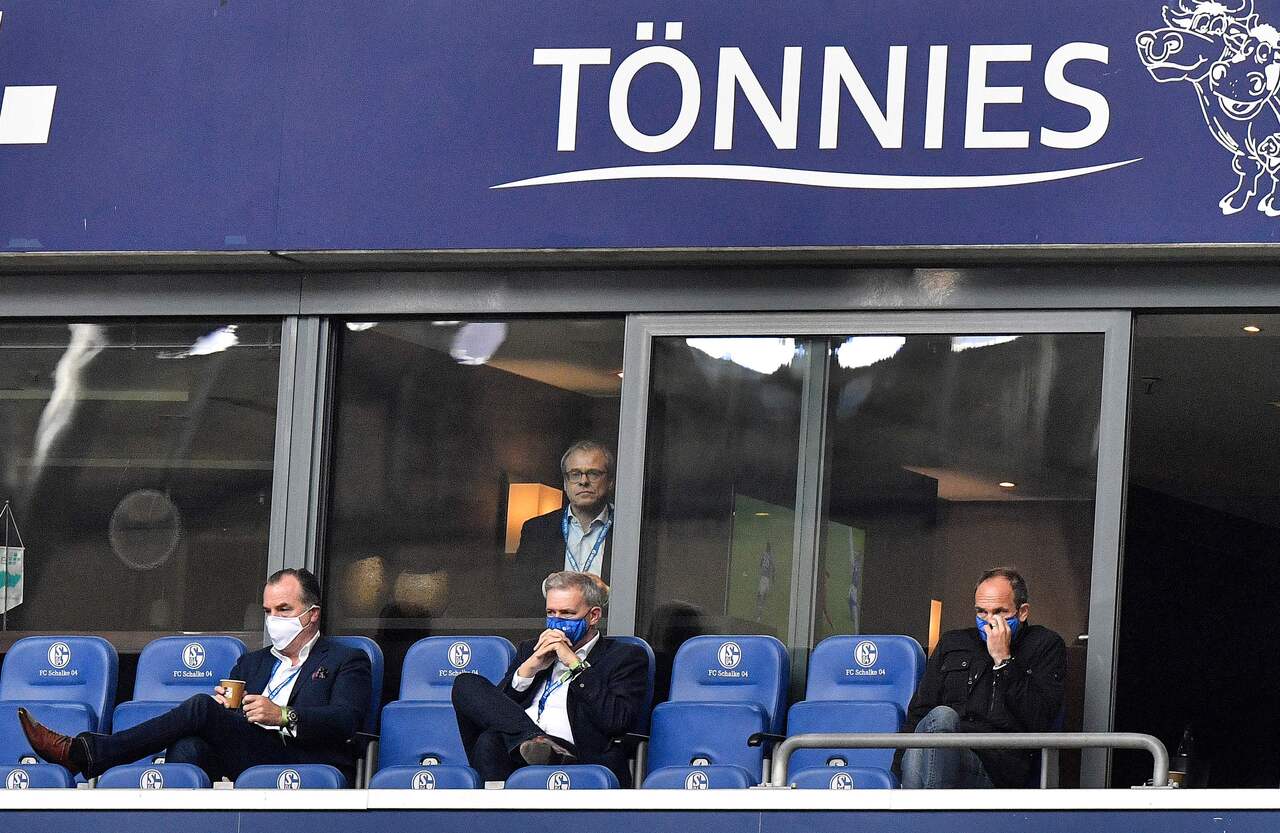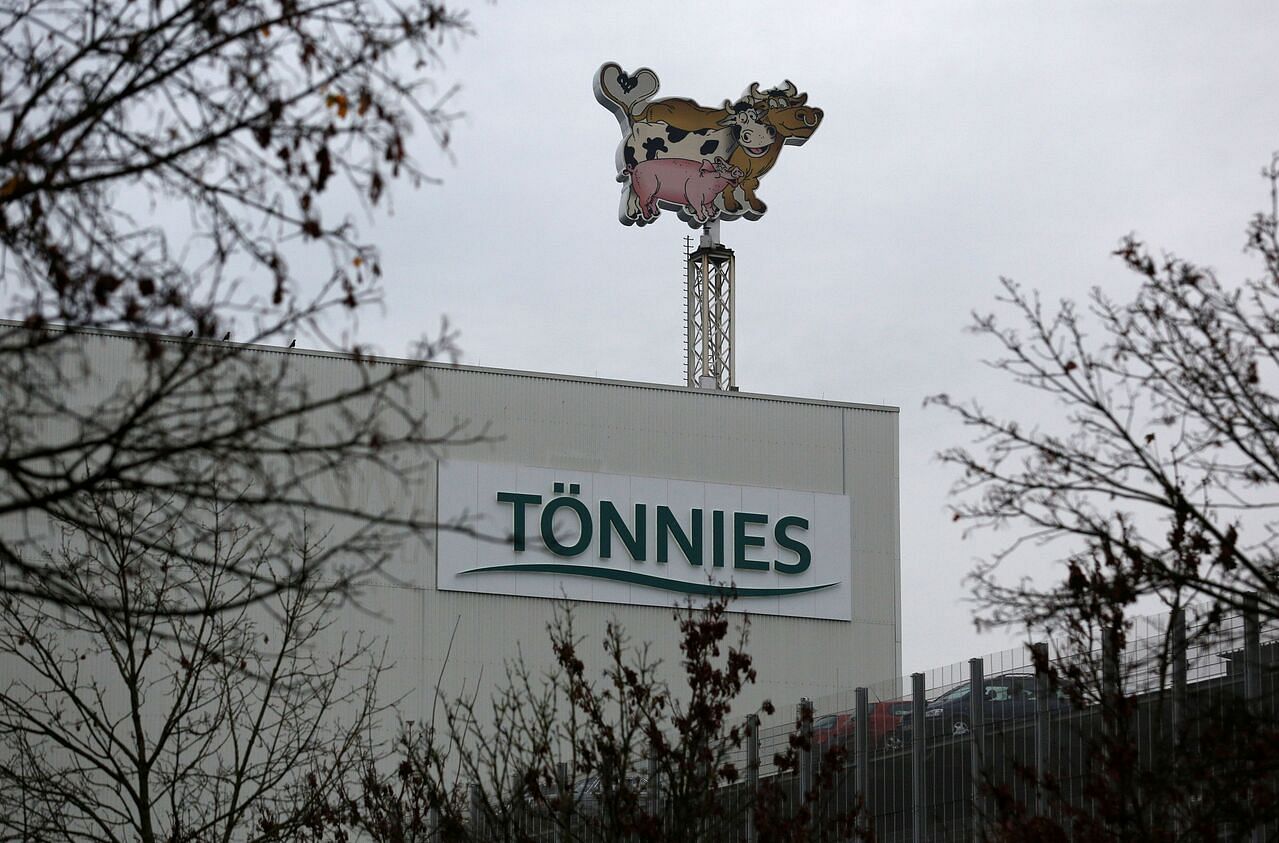Germany's billionaire 'Sausage King' Clemens Toennies faces coronavirus reckoning
Sign up now: Get ST's newsletters delivered to your inbox

Mr Clemens Toennies (left) also leads German football club Schalke.
PHOTO: AFP
Follow topic:
(BLOOMBERG) - Mr Clemens Toennies, known to Germans as a brash billionaire, is turning into a public villain after one of his meat-processing plants triggered the country's biggest single coronavirus outbreak.
Prosecutors and politicians are scrutinising his business model after more than 1,500 people - mainly poorly-paid contract workers from eastern Europe who live in cramped housing - tested positive, prompting authorities to close the plant.
It's the latest challenge for Mr Toennies, 64, who has previously weathered antitrust scrutiny and criticism for racist comments.
After failing for years to improve conditions for animals and workers, the man who also leads a German soccer club and has rubbed shoulders with Russian president Vladimir Putin is now facing a backlash for triggering a lockdown for 640,000 people, just as Europe's biggest economy restarts. Even in a country that loves bratwurst and schnitzel, some say his comeuppance was bound to happen.
"There's a lot of anger brewing," said Ms Sonja von Zons, a Green Party politician who's running for mayor of Rheda-Wiedenbrueck, where the shuttered pork plant is based.
"Mr Toennies for years rejected responsibility for what has been a destructive system for animals, workers and the environment. We're fed up."
The outbreak has caused a political stir in a country lauded for its virus response. Germany's governing parties want to speed up regulatory changes to improve working conditions and hygiene. Some politicians are considering asking Mr Toennies, dubbed the "sausage king" by German business weekly WirtschaftsWoche, to foot part of the lockdown bill.
After virus outbreaks at slaughterhouses in countries including the US, Australia and Brazil, the German spike is adding to bad news for the meat industry. Agriculture Minister Julia Kloeckner said on Friday (June 26) that Germany needs to "take a close look" at the meat production chain.
Mr Toennies, whose fortune is rooted in industrialising Germany's meat production, has a net worth of more than US$2 billion (S$2.8 billion), according to the Bloomberg Billionaires Index. Closely-held Toennies Holding, which he controls along with a son and a nephew, sends 21 million pigs a year into factories that churn out sausage, salami and pork chops. His company didn't respond to multiple requests for comment.
TEMPORARY WORKERS
Modernisation and cost-cutting started Mr Toennies's rise to one of the world's biggest meat producers after Europe's Cold War division faded in the 1990s, helping make Germany the world's third-largest pork producer after China and the US.
The cost model introduced by Mr Toennies was mimicked by other industry players and fuelled by discount grocery chains such as Aldi and Lidl as they grew in Germany and abroad, said Mr Jonas Bohl, a spokesman for the NGG labor union for food and hospitality industry workers. Attention has focused on the meat-industry practice of bringing in contract workers from countries such as Romania and Bulgaria for a few weeks at a time to work gruelling hours for relatively low pay.

<p>FILE PHOTO: General view of the Clemens Toennies meat factory in the western city of Rheda-Wiedenbrueck November 10, 2014. REUTERS/Ina Fassbender/File Photo</p>
PHOTO: X00970
"They want to sell cheap meat and found someone able to do it, and that was Clemens Toennies," Mr Bohl said by phone. "The whole system is broken and it needs to be rebuilt."
Mr Toennies is pledging to do that. He has said he'll stop hiring subcontractors and employ workers directly by next year and build better living quarters. He's also paying for food sent to quarantined workers and for coronavirus testing in the region.
"I will lead this company out of the crisis," he said at a news conference on June 20. "We will change this industry."
VEGETARIAN GERMANY
Even before the virus closed down restaurants and festivals, meat demand in parts of Europe was declining on environmental and animal-welfare concerns. A US Department of Agriculture report this year ranked Germany as one of the most vegetarian places in the world, and the European Union is officially promoting protein alternatives.
Started by Mr Toennies' brother in 1971, the company developed from a meat wholesaler into one of the world's biggest protein producers after a string of acquisitions, with 16,500 employees and sales of €7.3 billion (S$11.4 billion) last year. Mr Toennies owns 45 per cent of the company, according to Orbis, a collector of corporate data. The rest is held by his son Maximilian and his nephew Robert.
Mr Toennies caused an uproar last year with racist comments belittling Africans at a public event, which prompted him to temporarily step down as supervisory board chairman of Bundesliga club Schalke after almost two decades.
While he helped attract sponsors including Russia's Gazprom, some fans plan to protest against recent missteps by the club's leaders outside the team's arena in Gelsenkirchen on Saturday. The motto: "Schalke is no slaughterhouse."
Mr Toennies also has been criticised for a patriarchal leadership style and clashed over company strategy with his nephew. A "macho" company culture that lacks diversity has prevented meaningful change, said Prof Achim Spiller, a professor of marketing for food and agricultural products at the Georg August University of Goettingen.
"The industry hasn't been very open for new societal trends," Prof Spiller said. "As the largest player, Toennies could change that. The question is whether he's willing and able to do it."

